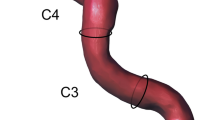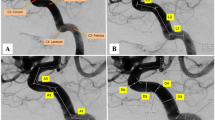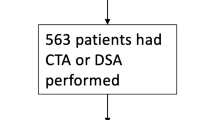Abstract
Purpose
Although a site common for pathology and of great importance to the neurosurgeon, the three-dimensional (3D) morphometry of the anterior communicating artery (ACoA) has had incomplete descriptions in the literature.
Methods
Using a novel 3D digital-image computer data analysis system, 115 patients underwent evaluation of their ACoA based on DICOM files derived from CT angiography. Measurements included the length, internal diameter, volume, deviation index (DI) and tortuosity index (TI).
Results
Of 115 samples, 85 were visualized clearly enough for morphometric analysis. The mean internal diameter was 1.86 mm and this tended to be greater in males (P < 0.05). The mean length of the ACoA was 3.99 mm and the mean volume was 11.61 mm3. The mean TI for the ACoA was 0.84 and the mean DI was 0.62 mm. A significant relationship between DI and length, DI and volume, and DI and TI were found. The significant correlation of diameter to volume, and length related to volume, DI and TI, as well as TI related to length, volume and DI were noticed. There were no relationship between any parameter and age.
Conclusions
A detailed knowledge of the 3D-morphometry of the ACoA demonstrates that in almost 50% of individuals the ACoA is straight in their course. Detailed data regarding arterial topography and trajectory as found in our study may be also of use in detecting early changes in this vessel due to pathology and may assist in the treatment of vascular lesions and planning of neurosurgical or interventional radiological procedures in the region including ACoA aneurysms.




Similar content being viewed by others
References
Alastruey J, Parker KH, Peiró J, Byrd SM, Sherwin SJ (2007) Modelling the circle of Willis to assess the effects of anatomical variations and occlusions on cerebral flows. J Biomech 40:1794–1805
Alpers BJ, Berry RG, Paddison RM (1959) Anatomical studies of the circle of Willis in normal brain. Arch Neurol Psychiatry 81:409–418
Avci E, Fossett D, Erdogan A, Egemen N, Attar A, Aslan M (2001) Perforating branches of the anomalous anterior communicating complex. Clin Neurol Neurosurg 103:19–22
Baptista AG (1963) Studies on the arteries of the brain. II The anterior cerebral artery: some anatomic features and their clinical implications. Neurology 13:825–835
Baptista AG (1966) Studies on the arteries of the brain. IV. Circle of Willis: functional significance. Acta Neurol Scand 42:161–175
Battacharji SK, Hutchinson EC, McCall AJ (1967) The circle of Willis—the incidence of developmental abnormalities in normal and infarcted brains. Brain 90:747–758
Bullitt E, Gerig G, Pizer SM, Lin W, Aylward SR (2003) Measuring tortuosity of the intracerebral vasculature from MRA images. IEEE Trans Med Imaging 22:1163–1171
Bullitt E, Zeng D, Gerig G, Aylward S, Joshi S, Smith JK, Lin W, Ewend MG (2005) Vessel tortuosity and brain tumor malignancy: a blinded study. Acad Radiol 12:1232–1240
Capowski JJ, Kylstra JA, Freedman SF (1995) A numeric index based on spatial frequency for the tortuosity of retinal vessels and its application to plus disease in retinopathy of prematurity. Retina 15:490–500
Cassot F, Vergeur V, Bossuet P, Hillen B, Zagzoule M, Marc-Vergnes JP (1995) Effects of anterior communicating artery diameter on cerebral hemodynamics in internal carotid artery disease. A model study. Circulation 92:3122–3131
Chrzanowska G, Mierzwa J (1979) Variation of the cerebral arterial circle (of Willis) in man. Folia Morphol (Warsz) 38:365–373
Crowell RM, Morawetz RB (1977) The anterior communicating artery has significant branches. Stroke 8(2):272–273
Diamond BJ, DeLuca J, Kelley SM (1997) Memory and executive functions in amnesic and non-amnesic patients with aneurysms of the anterior communicating artery. Brain 120:1015–1025
El-Noamany H, Nakagawa F, Hongo K, Kakizawa Y, Kobayashi S (2001) Low anterior interhemispheric approach—a narrow corridor to aneurysms of the anterior communicating artery. Acta Neurochir (Wien) 143:885–891
Gielecki JS, Żurada A, Gajda G, Nowak D, Sienkiewicz-Zawilińska J (2008) The description of vascular variations in three-dimensional space: a novel method of spatial cerebral arteries evaluation. Med Sci Monit 14(9):MT36–MT41
Gillilan LA (1959) Significant superficial anastomoses in the arterial blood supply to the human brain. J Comp Neurol 112:55–74
Gurdal E, Cakmak O, Yalcinkaya M, Uzun I, Cavdar S (2004) Two variations of the anterior communicating artery: a clinical reminder. Neuroanatomy 3:32–34
Hademenos GJ, Massoud TF (1997) Biophysical mechanism of stroke. Stroke 28:2067–2077
Hartkamp MJ, van der Grond J, van Everdingen KJ, Hillen B, Mali WP (1999) Circle of Willis collateral flow investigated by magnetic resonance angiography. Stroke 30:2671–2678
Hernesniemi J, Dashti R, Lehecka M, Niemelä M, Rinne J, Lehto H, Ronkainen A, Koivisto T, Jääskeläinen JE (2008) Microneurosurgical management of anterior communicating artery aneurysms. Surg Neurol 70:8–28
Hoksbergen AW, Fulesdi B, Legemate DA, Csiba L (2000) Collateral configuration of the circle of Willis: transcranial color-coded duplex ultrasonography and comparison with postmortem anatomy. Stroke 31:1346–1351
Inci S, Özgen T (2005) Multiple aneurysms of the anterior communicating artery: radiological and surgical difficulties. J Neurosurg 102:495–502
Jackowski AP, Meneses MS, Ramina R, Marrone AC, Stefani MA, Aquini MG, Winkelmann EC, Schneider FL (1999) Perforating and leptomeningeal branches of the anterior communicating artery: an anatomical review. Crit Rev Neurosurg 9:287–294
Kamath S (1981) Observations on the length and diameter of vessels forming the circle of Willis. J Anat 133:419–423
Kapoor K, Singh B, Dewan LI (2008) Variations in the configuration of the circle of Willis. Anat Sci Int 83:96–106
Kasuya H, Shimizu T, Nakaya K, Sasahara A, Hori T, Takakura K (1999) Angeles between A1 and A2 segments of the anterior cerebral artery visualized by three-dimensional computed tomographic angiography and association of anterior communicating artery aneurysms. Neurosurgery 45:89–93
Kawashima M, Rhoton AL Jr, Tanriover N, Ulm AJ, Yasuda A, Fujii K (2005) Microsurgical anatomy of cerebral revascularization. Part I: anterior circulation. J Neurosurg 102:116–131
Khamlichi A, Azouzi M, Bellakhdar F, Ouhcein A, Lahlaidi A (1985) Configuration anatomique du polygone de Willis de l’adulte, etudie par les techniques d’injection (a propos de 100 cerveaux). Neurochirurgie 31:287–293
Kim DW, Kang SD (2007) Association between internal carotid artery morphometry and posterior communicating artery aneurysm. Yonsei Med J 48:634–638
Kim HJ, Lee WC, Min KS, Lee MS, Kim YG, Kim DH (2004) Determination of the pterional approach side according to the direction of the aneurysm and the configuration of the H-complex in anterior communicating artery aneurysm. J Korean Neurosurg Soc 36(6):464–469
Krabbe-Hartkamp MJ, van der Grond J, de Leeuw FE, de Groot JC, Algra A, Hillen B, Breteler MM, Mali WP (1998) Circle of Willis: morphologic variation on three-dimensional time-of-flight MR angiograms. Radiology 207:103–111
Kwolek-Klimkiewicz J, Ciszek B, Aleksandrowicz R, Mazurowski W, Zabek M, Gorski R (1996) Microsurgical anatomy of the anterior communicating artery. Folia Morphol (Warsz) 55:369–370
Lang J (2001) Skull base and related structures. Atlas of clinical anatomy. Schattauer, Stuttgart
Lehecka M, Porras M, Dashti R, Niemelä M, Hernesniemi JA (2008) Anatomic features of distal anterior cerebral artery aneurysms: a detailed angiographic analysis of 101 patients. Neurosurgery 63:219–228
Marinković S, Milisavljević M, Marinković Z (1990) Branches of the anterior communicating artery Microsurgical anatomy. Acta Neurochir (Wien) 106:78–85
Moore S, David T, Chase JG, Arnold J, Fink J (2006) 3D models of blood flow in the cerebral vasculature. J Biomech 39:1454–1463
Morris P (2007) Practical neuroangiography. Lippincott Williams & Wilkins, Philadelphia
Müller HR, Brunhölzl C, Radü EW, Buser M (1991) Sex and side differences of cerebral arterial caliber. Neuroradiology 33:212–216
Okahara M, Kiyosue H, Mori H, Tanoue S, Sainou M, Nagatomi H (2002) Anatomic variations of the cerebral arteries and their embryology: a pictorial review. Eur Radiol 12:2548–2561
Osborn AG (1999) Diagnostic cerebral angiography. Lippincott Williams & Wilkins, Philadelphia
Pai SB, Kulkarni RN, Varma RG (2005) Microsurgical anatomy of the anterior cerebral artery—anterior communicating artery complex: an Indian study. Neurology Asia 10:21–28
Parikh AH, Smith JK, Ewend MG, Bullitt E (2004) Correlation of MR perfusion imaging and vessel tortuosity parameters in assessment of intracranial neoplasms. Technol Cancer Res Treat 3:585–590
Perlmutter D, Rhoton AL (1976) Microsurgical anatomy of the anterior cerebral-anterior communicating recurrent artery complex. J Neurosurg 45:259–272
Perlmutter D, Rhoton AL Jr (1978) Microsurgical anatomy of the distal anterior cerebral artery. J Neurosurg 49:204–228
Puchades-Orts A, Nombela-Gomez M, Ortuno-Pacheco G (1976) Variation in form of circle of Willis: some anatomical and embryological considerations. Anat Rec 185:119–123
Rhoton AL Jr, Perlmutter D (1980) Microsurgical anatomy of anterior communicating artery aneurysms. Neurol Res 2:217–251
Standring S (2005) Gray’s anatomy. Churchill Livingstone, Philadelphia
Uchino A, Nomiyama K, Takase Y, Kudo S (2006) Anterior cerebral artery variations detected by MR angiography. Neuroradiology 48:647–652
Wollschläger PB, Wollschläger G, Lopez VF, Krautmann JJ (1970) Tortuosity of the Perforating Arteries. Neuroradiology 1:195–199
Yasargil MG (1984) Microneurosurgery. Microsurgical anatomy of the basal cisterns and vessels oft he brain, diagnostic studies, general operative techniques and pathological considerations of the intracranial aneurysms. Georg Thieme Verlag, Stuttgart
Yasargil MG (1984) Microneurosurgery. Clinical considerations, surgery of the intracranial aneurysms and results. Georg Thieme Verlag, Stuttgart
Żurada A, Gielecki JS (2007) A novel formula for the classification of blood vessels according to symmetry, asymmetry and hypoplasia. Folia Morphol (Warsz) 66(4):339–345
Żurada A, Gielecki JSt, Baron J, Zawiliński J, Kozłowska H (2008) Interactive 3D stereoscopic digital-image analysis of the basilar artery bifurcation. Clin Anat 21:127–137
Author information
Authors and Affiliations
Corresponding author
Rights and permissions
About this article
Cite this article
Żurada, A., Gielecki, J., Shane Tubbs, R. et al. Detailed 3D-morphometry of the anterior communicating artery: potential clinical and neurosurgical implications. Surg Radiol Anat 33, 531–538 (2011). https://doi.org/10.1007/s00276-011-0792-z
Received:
Accepted:
Published:
Issue Date:
DOI: https://doi.org/10.1007/s00276-011-0792-z




